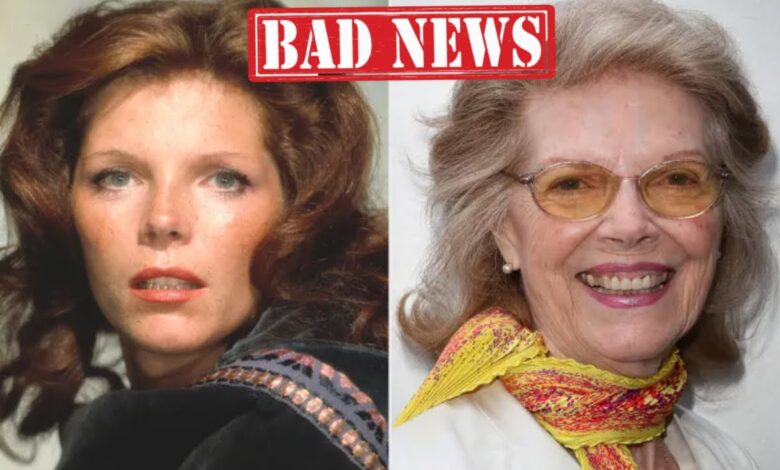Shock! Actress Samantha Eggar passed away at 86 due to a serious illness | General Hospital Spoilers

Samantha Eggar: A Quiet Storm of Artistry and Grace
The entertainment world is in mourning following the passing of Samantha Eggar, a luminous force of film, television, and stage whose artistry spanned more than six decades. Her death at the age of 86, announced in mid-October, leaves an indelible void in the hearts of film lovers, especially those devoted to classic horror and daytime drama. For many, Eggar was not merely an actress—she was a bridge between eras of storytelling, a woman whose talent, intellect, and grace transcended generations.
Born Victoria Louise Samantha Marie Elizabeth Theresa Eggar on March 5, 1939, in Hampstead, England, she passed peacefully in her Sherman Oaks home after a lengthy illness. Her daughter, actress Jenna Stern, confirmed the news in a moving tribute that described her mother’s final moments as “gentle and full of love.” It was a fitting close to a life defined by quiet elegance, depth, and emotional truth.
Early Life and the Making of an Artist
Raised in Buckinghamshire during the turmoil of World War II, Eggar spent 12 formative years in a convent. It was within those austere walls that she developed a profound appreciation for poetry, literature, and music. The silence of that environment—its stained glass and solitude—shaped her inner world and gave her performances a meditative stillness that would later become her signature.
Her mother, wary of the instability of show business, forbade her from attending the Royal Academy of Dramatic Art, despite Eggar winning a scholarship. Yet fate had other plans. A cousin secretly drove her to an audition at the Webber Douglas Academy of Dramatic Art, setting her on a path that would change both her life and the landscape of film forever.
Her early stage work in Landscape with Figures introduced her to the professional world, but her breakout came in 1965 with “The Collector.”
“The Collector” and the Birth of a Star
At just 26 years old, Samantha Eggar delivered one of cinema’s most haunting performances as Miranda Grey, a young woman abducted by a disturbed man, played by Terence Stamp. Directed by William Wyler, the psychological thriller became an instant classic, earning Eggar the Best Actress Award at Cannes, a Golden Globe, and an Academy Award nomination.
The film’s production was famously grueling—Wyler sought authenticity to the point of putting Eggar through emotionally and physically taxing scenes. Yet, rather than resentment, Eggar viewed the experience as transformative. “It wasn’t suffering—it was becoming,” she once reflected.
Her portrayal of Miranda was both heartbreaking and revolutionary. In an age when women on screen were often reduced to archetypes, Eggar’s performance was layered with strength and vulnerability, intellect and instinct. She didn’t play for sympathy; she demanded emotional recognition.
A Career of Infinite Versatility
Eggar’s career that followed defied genre and expectation. In “Doctor Dolittle” (1967), she displayed lightness and humor, performing alongside Rex Harrison in a musical fantasy that showcased her range. In films such as “Return from the Ashes” and “Walk, Don’t Run,” she effortlessly pivoted between psychological drama and romantic comedy.
One of her most striking turns came in “The Lady in the Car with Glasses and a Gun” (1970), where she played a woman descending into psychological chaos. Critics praised her performance as mesmerizing—Roger Greenspun of The New York Times hailed it as “a revelation” for its portrayal of fragility wrapped in intelligence and mystery.
Eggar became known for capturing the contradictions of womanhood—strong yet haunted, composed yet unraveling. She could make silence more powerful than speech, stillness more commanding than motion.
The Soap Opera Connection: A Legacy of Complexity
In the 1970s and 1980s, television gave Eggar a new platform. Her performance as Charlotte Devane on All My Children became legendary. Believed to be the mother of Anna Devane (played by Finola Hughes), the storyline intertwined her fate with that of General Hospital, bridging two of daytime television’s most powerful legacies.
Her chemistry with Hughes was electric—two generations of soap royalty colliding in scenes of elegance, deception, and emotion. Even when the truth emerged that Charlotte was not truly Anna’s mother, viewers remained captivated by Eggar’s enigmatic portrayal.
Her Charlotte was regal, maternal, and menacing all at once. In a genre often known for its excess, she brought restraint and subtlety. She became the archetype of the “dark matriarch”—a woman whose every gesture concealed a labyrinth of secrets.
Queen of Psychological Horror
Beyond soaps, Eggar’s name became synonymous with the art of psychological horror. Her most celebrated foray into the genre came with David Cronenberg’s “The Brood” (1979).
In this chilling exploration of rage and trauma, Eggar played Nola Carveth, a woman undergoing experimental therapy whose repressed anger manifests as monstrous, murderous children. The role demanded emotional bravery and physical vulnerability—and Eggar delivered both in devastating measure.
She transformed what could have been pulp horror into tragic poetry. Her performance was not about shock—it was about empathy. “The Brood” explored the terror of motherhood, the shadow of emotional inheritance, and the pain of silence. Cronenberg once called it his most personal film, and Eggar gave it its soul.
Her horror legacy continued in cult classics such as “The Uncanny” (1977) and “Curtains” (1983), where she portrayed women haunted not by monsters, but by memory and manipulation. She redefined the genre—not as a scream queen, but as an intellectual interpreter of fear.
Grace Beyond the Screen
Offscreen, Samantha Eggar was known for her spirituality, compassion, and love of animals. A lifelong advocate for animal welfare, she rescued countless dogs over the years. Their collars, lovingly preserved and hung along the walls of her home, became silent reminders of lives she cherished.
In her later years, she served as a minister and meditation guide at the Church of the Good Shepherd in Beverly Hills. Those who attended her sessions recall her voice—once the instrument of cinematic power—becoming an anchor of peace. She led not through doctrine, but through empathy and presence.
“She didn’t preach—she listened,” one parishioner remembered.
Eggar’s home reflected her spirit: filled with books, paintings, classical music, and an atmosphere of serenity. Despite her fame, she remained humble, preferring conversation and contemplation to celebrity.
Motherhood and Legacy
Her marriage to actor Tom Stern produced two children, Jenna and Nicholas, both of whom carried forward her artistic legacy—Jenna as an actress, Nicholas as a producer. Eggar viewed motherhood as her greatest role, calling it “the purest form of storytelling.”
Even in illness, she refused to retreat. She read poetry aloud, mentored young actors, and wrote reflections that blended philosophy and gratitude. She once said that art and spirituality were the same act: “Both are ways of seeking truth through empathy.”
An Enduring Light
Over her 60-year career, Samantha Eggar’s work spanned nearly 100 roles across film, television, and stage. Yet her influence cannot be measured by numbers or accolades. It is best seen in the generations of actors who cite her as inspiration, and in audiences who found pieces of themselves in her performances.
She defied the superficiality of fame. She was a woman of quiet rebellion—one who made vulnerability her strength and empathy her art.
Samantha Eggar’s death marks the closing of a cinematic era, but her legacy will endure—in the trembling hands of actors who dare to feel deeply, in the haunting silence between dialogue, and in the hearts of those who found healing in her humanity.
She was not merely an actress.
She was a storyteller.
A soul carver.
A quiet storm of truth.
And though her voice has stilled, the echoes of it—tender, intelligent, and eternal—will never fade.




